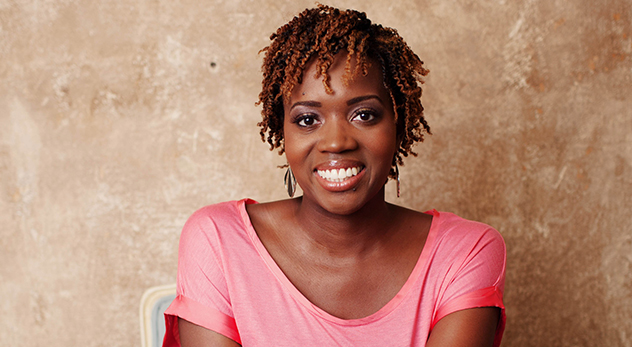
Spoken word artist Amena Brown talks about poetry, freedom, and what it is like to be a black woman in a faith community dominated by white men. – Image courtesy of Amena Brown
As a poet, spoken word artist and author, Amena Brown’s words excite, ignite and inspire. She and her husband, Matt, also known as DJ Opdiggy, travel and perform a presentation of poetry, monologue and deejaying. In this interview she talks about her debut book release, Breaking Old Rhythms: Answering the Call of a Creative God, how we can better tune our ears and lives to the rhythm of God, and what it’s like to be an outspoken African-American female personality in a predominately white and male evangelical culture.
JM: How would you explain spoken word as a creative medium to someone unfamiliar?
AB: Spoken word is typically free verse poetry written, to be performed, not just to be read. Spoken word sometimes also includes the wordplay of hip-hop and the rhythms of jazz. It is an art that thrives on originality and each poet using his or her unique voice and point of view to tell a story. I like to say if hip-hop and jazz had a poetry baby, it would be spoken word.
JM: How does faith intersect with your art – is it intentional or natural?
AB: Whether or not I write something explicitly about God, my journey of faith always makes it to the page, from writing about music, prayer, relationships or being a nerd growing up. Performing spoken word means bringing your soul and your story to stage, and for me, my faith is at the center of that story.
JM: What was your journey to becoming a believer?
AB: My mom recommitted her life to Jesus when I was 12. I watched her life change so much that I started to be more interested in what it meant to be a Christian. She took me to church and the lady leading the kid’s service told us that we didn’t have to pray and ask Jesus into our heart in front of everyone if we didn’t want to. She said we could pray to Jesus anywhere. So I went home and decided to ask Jesus into my heart in my closet. I probably did this because I had a 2-year-old sister at the time, and I was pretty sure the closet would get me some privacy. Through high school, college and into my twenties, I had the opportunity to not just know about Jesus but to know him for myself. That has changed my life.
JM: You mentioned that your book was the first time you felt “beat” by the creative process. Why was that & how did you overcome?
AB: The first draft of my book felt like it beat me because I had an idea of how I wanted the book to be, and it felt like no matter how much I wrote and edited I couldn’t get the words to match up to that idea. While writing Breaking Old Rhythms, I came to appreciate even more the power of drafting. Sometimes ideas need molding. Having an awesome editor who asked the questions that helped me to write better and more fully, and having a few readers who weren’t afraid to give me critique, really helped Breaking Old Rhythms to be the best book it could be. By the time I got to my final draft of Breaking Old Rhythms, I thought, “Ah, I finally beat you!”
JM: How did you feel like you had to break your rhythm in order to tell others about breaking theirs?
AB: Breaking old rhythms has two pathways: you choose to break rhythm or life chooses to break rhythm for you. Most of my experience has been when life’s interruptions, unexpected successes, hard-hitting failures, forced me to change and find a new groove. Those experiences helped me to appreciate the times I had the opportunity to choose to break an old rhythm. Learning new things and connecting with people who are different from me, continues to break my old rhythms and keeps me inspired. When I’m not experiencing some sort of broken rhythm, I feel uninspired and stuck. I felt that I, like many other people, had experienced broken rhythm and wanted to learn how to embrace it, learn from it, and see God’s love through it. I hope that the stories in this book help the reader to do the same.
JM: You’re a black woman in evangelical circles that are predominately white and male. What hurdles do you see women and minorities facing to get their message out in this culture and what advice would you give them?
AB: The biggest hurdle I see is not just something women and minorities face, but something we all face as believers, which is that a lot of us stick to spending most of our time with people who are like us in denomination, ethnicity, gender, class and culture. I think if there were more willingness to include diverse voices at our events and in our lives, we would all be better for it.
The advice I would give to minority and women leaders is the same advice I would give to any artist, entrepreneur or person with a dream: first and foremost, be true to the story and gifts God has given to you and surrender those gifts to him. Take whatever gifts God has given you and sharpen and develop them. Not so you can appear perfect in front of anyone, but so you can give God your absolute best. Connect with people who are like you and like-minded and also relate with people who are different from you. This way, all of us as leaders could use our energy to create fewer factions and build more bridges.
http://www.youtube.com/watch?v=ZWgqSyqpoB4





